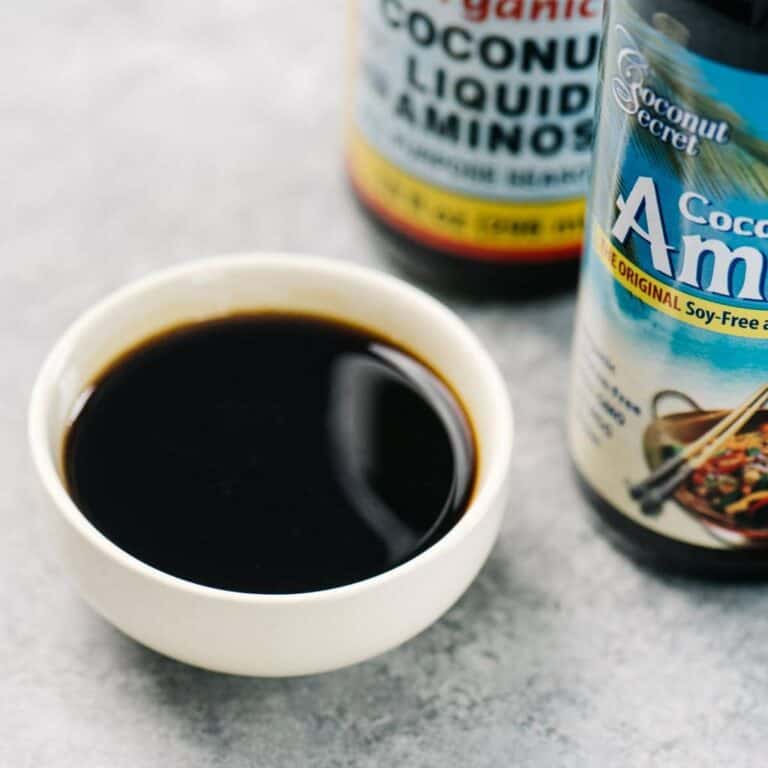Does Fish Sauce Really Taste Like Fish? Fish Sauce Flavor Explained

Welcome to the fascinating world of fish sauce flavor! If you’ve ever found yourself curious about this exotic condiment, you’re in for a treat. Imagine a sauce that adds depth, complexity, and a touch of the extraordinary to countless Southeast Asian dishes. That’s fish sauce for you. But here’s the burning question: Does fish sauce really taste like fish?
Prepare to have your taste buds tickled and your culinary perceptions challenged as we embark on a flavorful exploration. Brace yourself for a journey beyond the mere oceanic realm. Fish sauce is not just about fishiness; it’s a symphony of umami, a dance of savory sensations, and a masterclass in flavor enhancement.
So, let’s set sail on this gustatory adventure and unravel the secrets of fish sauce flavor. Get ready to elevate your culinary repertoire and discover why fish sauce is a prized gem in the realm of gastronomy.
Introduction to Fish Sauce and its History
Fish sauce has a long and fascinating history. It originated in ancient civilizations such as ancient Rome and ancient Greece, but it found its true home in Southeast Asia. Countries like Thailand, Vietnam, and the Philippines have deeply ingrained fish sauce traditions. They have been passed down through generations.
Different types of fish sauce exist, but they all share a common base: fermented fish. Anchovies, mackerel, and other small, oily fish are commonly used in the production process. The fish is combined with salt and left to ferment, creating a savory and pungent liquid known as fish sauce.
Fish Sauce Production Process
The production of fish sauce involves a careful and time-honored process. Here are the key steps:
- Ingredients: Fresh fish, usually anchovies or mackerel, is the primary ingredient. Salt is added to the fermentation process.
- Fermentation: The fish are layered with salt in large barrels or containers. Over time, the salt extracts the liquid from the fish, promoting fermentation. This process can take months to a year, allowing the flavors to develop and intensify.
- Straining: Once fermentation is complete, the mixture is pressed or strained. This is to separate the liquid from the solid remnants of the fish. This results in a clear, amber-colored fish sauce.
- Aging: The fish sauce is then aged for a period, usually in wooden barrels or ceramic jars. This aging process enhances the flavors and develops the distinct aroma smell associated with fish sauce.
Modern production methods often incorporate stainless steel tanks and industrial processes. Doing so to ensure consistency and quality, although traditional methods are still valued for their artisanal touch.
Does Fish Sauce Really Taste Like Fish?

One common question that arises is whether fish sauce really tastes like fish. While it does have a distinct fishy flavor, fish sauce isn’t intended to be consumed on its own but rather used as a seasoning. The intensity of the fishiness can vary depending on several factors, including:
- Fish Type: Different types of fish used in fish sauce production can impart varying levels of fishiness.
- Fermentation Duration: The length of the fermentation process affects the fishy taste. Longer fermentations tend to result in a stronger fish flavor.
- Quality and Brand: The quality and brand of fish sauce can also influence the fishiness. Premium fish sauces often undergo meticulous production processes that result in a more balanced and refined flavor.
If you’re concerned about the fishy taste overpowering your dishes, there are ways to mitigate or enhance it according to your preference. Here are some tips:
- Balancing Flavors: Incorporate other ingredients and flavors in your recipe that can balance out the fishy taste. Ingredients like lime juice, garlic, ginger, and herbs can help mellow the fishiness while adding freshness and complexity.
- Dilution: If you’re worried about the intensity of fish sauce in a recipe, dilute it with water, broth, or citrus juice. This will help tone down the fishy taste while still imparting the desired flavor.
- Cooking and Heat: Cooking fish sauce can also reduce its fishy taste. The heat helps mellow the flavors and integrate them with other ingredients. Consider adding fish sauce to your dish during the cooking process rather than using it as a finishing touch.
- Experimentation: Explore different brands and types of fish sauce to find one that aligns with your taste preferences. Some brands offer variations with milder fish flavors, while others may have a more pronounced taste. Don’t be afraid to experiment and find the one that suits your palate.
Remember, fish sauce is a highly versatile ingredient, and its fishiness can be modulated to suit a wide range of dishes and flavor profiles.
Key Flavors and Aromas in Fish Sauce
Fish sauce boasts a rich and complex flavor profile that goes beyond just tasting like fish. Here are the key flavors and aromas you can expect:
- Umami Taste: Fish sauce is renowned for its umami taste, which is savory and deeply satisfying. Umami is often described as the fifth taste sensation, distinct from sweet, sour, salty, and bitter. It adds depth and richness to dishes.
- Salty and Savory Notes: The salt used in the fermentation process imparts a salty taste to the fish sauce. This saltiness, combined with the savory umami flavor, creates a well-balanced and robust taste.
- Pungent Aroma: Fish sauce has a distinct and pungent aroma that can be intense, especially in its concentrated form. The fermentation and aging process contribute to this unique smell, which mellows and blends harmoniously when used in cooking. Some people may consider fish sauce to smell so bad, but actually it is as a result of fermentation.
Fish Sauce as a Flavor Enhancer
Fish sauce plays a crucial role in Asian cuisine as a flavor enhancer. It adds depth and complexity to dishes, elevating their overall taste. Here are some common ways fish sauce is used:
- Soups and Broths: Fish sauce adds depth and umami to soups and broths, such as Vietnamese pho or Thai tom yum soup or Korean Fish Sauce Sop Chung Jung One.
- Stir-Fries and Curries: It is a key ingredient in many stir-fries and curries, providing a savory foundation to build upon.
- Marinades and Dipping Sauces: Fish sauce is often used as a marinade for rib or meats and seafood, infusing them with a rich umami flavor. It also serves as a base for dipping sauces, adding a punch of taste.
By balancing and enhancing other flavors in a dish, fish sauce helps create a harmonious and satisfying culinary experience.
Using Fish Sauce in Cooking
Now that we understand the unique flavor of fish sauce, let’s explore how it is used in cooking. Fish sauce is incredibly versatile and can be incorporated into various recipes to elevate their taste.
Here are some popular uses of fish sauce in different cuisines:
| Cuisine | Dish | Fish Sauce Application |
| Vietnamese | Phở (Beef Noodle Soup) | Added to the broth for depth and complexity. |
| Thai | Pad Thai (Stir-Fried Noodles) | Used as a seasoning in the sauce, providing umami and saltiness. |
| Thai | Pad Kee Mao (Drunken Noodles) | Added to soaked rice noodles |
| Cambodian | Fish Amok (Curry Fish Mousse) | Mixed into the curry paste for an authentic flavor. |
| Filipino | Adobo (Braised Meat) | Added to the marinade or sauce for a tangy and savory taste. |
| Korean | Kimchi (Fermented Vegetables) | Used to enhance the umami and depth of flavor in kimchi. |
| Chinese | Stir-Fried Greens with Garlic and Oyster Sauce | Combined with other sauces to amplify the umami and add a hint of fishiness. |
As you can see, fish sauce plays a vital role in these cuisines, imparting its unique flavor profile to a wide range of dishes. It adds complexity, depth, and a touch of authenticity that are difficult to replicate with other ingredients.
When using fish sauce in your cooking, it’s essential to keep a few things in mind:
- Moderation is key: Fish sauce can be quite potent, so it’s crucial to use it sparingly, especially if you’re new to its flavor. Start with small amounts and gradually increase as you become more accustomed to its taste.
- Balance with other flavors: Fish sauce is best used in combination with other ingredients to create a harmonious balance of flavors. It acts as a supporting player, enhancing the overall taste without overpowering the dish. Experiment with complementary ingredients like lime juice, garlic, ginger, or chili to create a well-rounded flavor profile.
- Choose quality fish sauce: Like any ingredient, the quality of fish sauce can vary. Opt for brands that use traditional fermentation methods and high-quality fish. Look for fish sauces that have a clear, amber color and a rich, complex aroma. It’s worth investing in a reputable brand for the best flavor experience.
- Store properly: Once opened, fish sauce should be stored in a cool, dark place, away from direct sunlight. Proper storage ensures its flavor and quality are preserved for longer periods.
Read: Fish Sauce and Omega-3
Fish Sauce Substitutes and Alternatives
For individuals with dietary restrictions or those who simply prefer to avoid fish sauce, there are several alternatives available. Here are some options:
- Soy Sauce: Soy sauce, particularly the darker and less sweet varieties like tamari or dark soy sauce, can be used as a substitute for fish sauce. It provides a similar salty and savory profile, although it lacks the distinct fishy taste.
- Miso Paste: Miso, a traditional Japanese fermented soybean paste, can add depth and umami to dishes. It may not replicate the exact flavor of fish sauce but can provide a rich and savory element.
- Anchovy Paste: Anchovy paste, made from ground anchovies, offers a concentrated fish flavor similar to fish sauce. It can be used in smaller quantities to add a hint of umami to recipes.
- Vegetarian and Vegan Fish Sauce: Some companies produce vegetarian and vegan versions of fish sauce, often using ingredients like seaweed or mushrooms. These alternatives aim to mimic the flavors of traditional fish sauce while remaining suitable for plant-based diets.
When substituting fish sauce, consider the specific flavors and characteristics of the dish you’re preparing. While alternatives can provide similar elements of umami and saltiness, they may not replicate the exact taste of fish sauce. It’s a matter of personal preference and experimentation to find the best substitute for your desired recipe.
Conclusion
Now that we’ve explored the flavor and usage of fish sauce, you might be inspired to embark on your own culinary adventure. Try incorporating fish sauce into your favorite recipes or exploring new dishes from Southeast Asian cuisines. With its unique umami taste and complexity, fish sauce adds a delightful twist to stir-fries, soups, marinades, and dressings.
As you experiment with fish sauce, remember that taste preferences can vary. Some individuals may enjoy a more pronounced fishy flavor, while others prefer a milder touch. Don’t be afraid to adjust the amount of fish sauce according to your own palate.
In conclusion, fish sauce does have a distinct fishy aroma, but its taste goes beyond just fishiness. It offers a complex and savory umami flavor that enhances a wide range of dishes. The key lies in using fish sauce in moderation and in combination with other ingredients to create a harmonious balance of flavors. So, if you’re up for a culinary adventure, grab a bottle of fish sauce and discover the incredible depth it can bring to your cooking.
FAQs
Can I use fish sauce if I don’t like the taste of fish?
Absolutely! Fish sauce is more than just the taste of fish. Its complex flavor profile includes umami, saltiness, and savory notes. When used in appropriate amounts and combined with other ingredients, the fishy taste can be balanced or even complemented, enhancing the overall flavor of your dish.
Is fish sauce gluten-free?
Fish sauce is typically gluten-free. However, it’s always important to check the label or contact the manufacturer to ensure that there are no gluten-containing additives or cross-contamination during the production process.
Can I substitute fish sauce in recipes?
Yes, there are several substitutes for fish sauce, such as soy sauce, miso paste, and anchovy paste. The choice of substitute depends on the specific flavors and characteristics you want to achieve in your dish. Experiment with different options to find the best substitute for your recipe.
Does fish sauce need to be refrigerated?
Fish sauce does not require refrigeration but should be stored in a cool, dark place. Refrigeration can extend its shelf life, but it may also cause the sauce to thicken. However, always refer to the manufacturer’s recommendations for storage instructions.
Can I use fish sauce if I have a seafood allergy?
If you have a seafood allergy, it’s essential to avoid fish sauce, as it is derived from fish. Even though the sauce undergoes fermentation, it may still contain allergenic proteins. It’s crucial to read labels carefully and consult with your healthcare provider if you have any concerns or allergies






